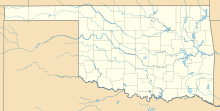Battle of Little Robe Creek
| Battle of Little Robe Creek | |||||||
|---|---|---|---|---|---|---|---|
| Part of the Comanche Wars, Texas-Indian Wars, Apache Wars | |||||||
 Comanche warriors, circa 1870. |
|||||||
|
|||||||
| Belligerents | |||||||
|
Tonkawa Caddo Anadarko Waco Shawnee Delaware Tahaucano |
Comanche Kiowa Apache |
||||||
| Commanders and leaders | |||||||
|
Shapley P. Ross Placido-Tonkawa O'quinn-Tonkawa Jim Pockmark-Caddo-Anadarko Jose Casa Maria-Caddo Shot Arm-Waco Jim Linney-Shawnee-Delaware Nid-e-wats-Tahuacano |
Iron Jacket † Peta Nocona |
||||||
| Strength | |||||||
| 100 Americans 113 Indian allies |
200-600 | ||||||
| Casualties and losses | |||||||
| 2 killed and 4-5 wounded | 76 killed 60 captured 400 horses captured |
||||||
|
|
|||||||
The Battle of Little Robe Creek, also called the Battle of Antelope Hills, took place on May 12, 1858. It actually was a series of three distinct encounters that took place on a single day, between the Comanches on the one side, and Texas Rangers, militia, and allied Tonkawas attacking them. It was undertaken against the laws of the United States at the time, which strictly forbade such an incursion into the Indian Territories of Oklahoma, and marked a significant escalation of the Indian Wars. It also marked the first time American or Texas Ranger forces had penetrated the Comancheria as far as the Wichita Mountains, and Canadian River, and it marked a decisive defeat for the Comanches.
Military historians distinguish between the Antelope Hills Expedition by the Texas Rangers and the Battle of Little Robe Creek with the former being the entire campaign against the Comanche conducted from January to May, 1858, starting in Texas above the Edwards Plateau, and continuing on to the Indian Territories in what is now Oklahoma. The latter is the specific battle at Little Robe Creek, with all three encounters counting as one sustained, day-long battle, and which took place on May 12, 1858. Since federal troops would not attack the Comanche and Kiowa in that portion of the Comancheria, the Texas Rangers launched the incursion into the Antelope Hills.
The years 1856 to 1858 were particularly vicious and bloody on the Texas frontier as settlers continued to expand their settlements into the Comanche homeland, the Comancheria. Valuable Indian hunting grounds were plowed under, and grazing range for the Comanche horse herds lost. The Comanche realized their homeland of the Comancheria was increasingly encroached on by Anglo-Texas settlers and they struck back with a series of ferocious and bloody raids into Texas.
The United States Army proved wholly unable to stem the violence. Federal units were being transferred out of the area for reasons that seemed driven more by political than military considerations. At the same time, federal law and numerous treaties forbade incursion by state forces into the federally protected Indian Territories. The U.S. Army was likewise instructed not to attack Indians in the Indian Territories or to permit such attacks. The reasoning behind the order was that many native tribes, such as the Cherokee, were engaged in farming, and living as peaceful settlers. While other tribes, such as the Comanche and Kiowa, continued to use that part of the Indian Territories that was the Comancheria to live in while raiding white settlements in Texas.
...
Wikipedia

